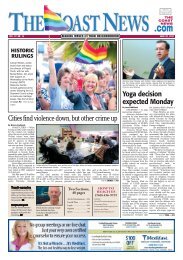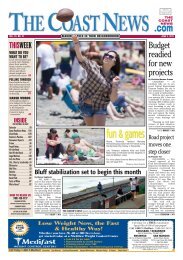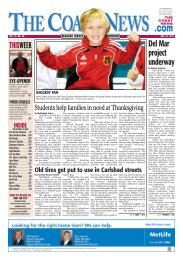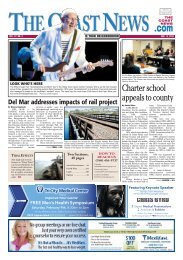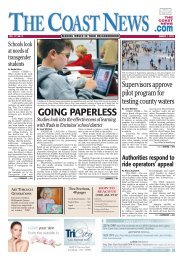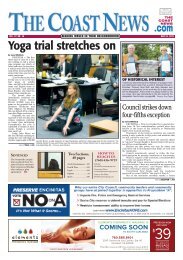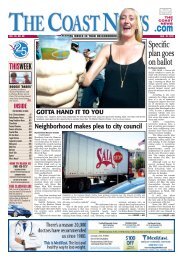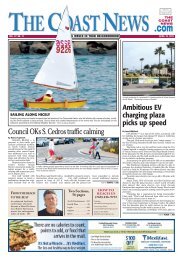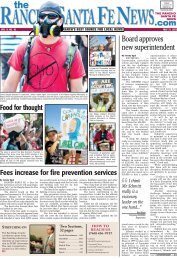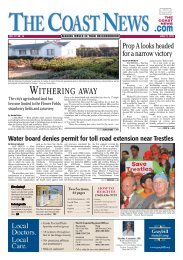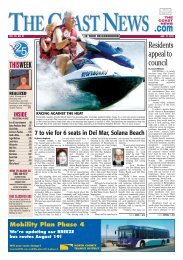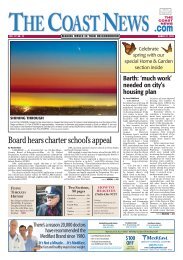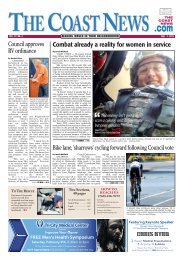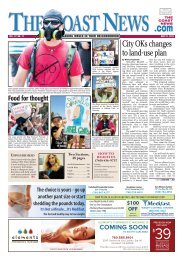FREE - The Coast News
FREE - The Coast News
FREE - The Coast News
You also want an ePaper? Increase the reach of your titles
YUMPU automatically turns print PDFs into web optimized ePapers that Google loves.
NOV. 12, 2010<br />
years of age, about 6 feet tall<br />
and between 160 and 180<br />
pounds.<br />
<strong>The</strong> FBI reports that the<br />
bandit is wanted for 10 bank<br />
robberies in San Diego<br />
County and one in Temecula,<br />
the earliest dating back to<br />
August 2009.<br />
Power was arrested Nov. 1<br />
after allegedly entering three<br />
locations within minutes of<br />
each other and demanding<br />
cash with a note, and in one<br />
instance he revealed a handle<br />
of a gun after he lifted his<br />
shirt, according to Lt. Kelly<br />
Cain, investigator with the<br />
Carlsbad Police Department.<br />
“An Oceanside teller<br />
heard him say, ‘I am that guy,’<br />
and a supervisor heard him<br />
say ‘I am the Geezer Bandit,’”<br />
Cain said.<br />
But authorities do not<br />
believe Power is the Geezer<br />
Bandit.<br />
“If we could hammer this<br />
guy as the Geezer Bandit, we<br />
would have done it,” Cain<br />
said.<br />
Besides differences in<br />
Power’s age appearance and<br />
the Geezer Bandit’s, the way<br />
the robberies were conducted<br />
was not similar.<br />
“<strong>The</strong> Geezer went up and<br />
down the coast,” Cain said of<br />
the Geezer’s bank robberies.<br />
Power went door-to-door,<br />
he said.<br />
According to the<br />
Carlsbad Police Department,<br />
at shortly after 3 p.m. Nov. 1,<br />
Power entered a medical<br />
office at 2626 El Camino Real<br />
and presented a receptionist<br />
with a demand note for cash.<br />
Power left the office after<br />
the receptionist told him<br />
there wasn’t any cash on hand,<br />
police said.<br />
Minutes later, Power then<br />
entered a Bank of America,<br />
which was one block north of<br />
the medical office, and was<br />
unsuccessful at his attempt to<br />
rob the bank with a demand<br />
note, according to police.<br />
At his final robbery<br />
attempt, Power entered the<br />
Wells Fargo Bank on Vista Way<br />
in Oceanside, where he pre-<br />
THE COAST NEWS<br />
Preparing for financial emergencies can save you later<br />
By Consumer Reports<br />
One lesson of the recent<br />
recession is the importance<br />
of stashing away cash in case<br />
you lose your job, your<br />
investments falter, or you’re<br />
hit with some other calamity.<br />
It’s a lesson that many<br />
Americans have taken to<br />
heart. Consumer Reports<br />
Money Adviser reports that<br />
savings as a percentage of<br />
disposable personal income<br />
climbed to 5.9 percent in<br />
2009 from 2.1 percent in<br />
2007, according to the federal<br />
Bureau of Economic<br />
Analysis.<br />
In a spring 2010 survey<br />
by the Consumer Reports<br />
National Research Center, 43<br />
percent said they were put-<br />
BANDIT<br />
CONTINUED FROM A1<br />
ting more into savings.<br />
<strong>The</strong> editors of CRMA<br />
offer the following tips on<br />
how to amass cash for emergencies<br />
and future purchases:<br />
Set a goal<br />
But how much should<br />
you save, and where should<br />
you keep the money?<br />
A reasonable goal is to<br />
save six months of living<br />
expenses, perhaps more<br />
while the economy remains<br />
sour.<br />
But the amount that<br />
makes sense for you depends<br />
on a number of factors,<br />
including your job security,<br />
your health and the quality<br />
of your health-care coverage,<br />
and how much debt you have.<br />
Other considerations include<br />
the number of wage earners<br />
in your household; whether<br />
you have dependent children;<br />
and your access to<br />
emergency sources of credit,<br />
including home-equity lines<br />
and even family members.<br />
An emergency fund will<br />
help you keep your household<br />
running if you lose your<br />
job or face any other costly<br />
crisis without having to borrow,<br />
especially in a tight<br />
credit environment, or cash<br />
out your investments at what<br />
could be an inopportune<br />
time.<br />
To avoid the temptation<br />
of spending that money, create<br />
a separate capital fund<br />
for big-ticket expenses you<br />
expect within the next five<br />
years, such as a new car or a<br />
down payment on a house.<br />
Getting there<br />
Consumer Reports<br />
Money Adviser recommends<br />
taking a hard look at where<br />
your money is going — your<br />
fixed expenses and your discretionary<br />
spending — to see<br />
where you might free up<br />
some cash to put toward savings<br />
each month.<br />
Your basic living expenses,<br />
including mortgage or<br />
rent, utilities, insurance,<br />
food, and clothing, should<br />
equal no more than about 60<br />
percent of your income. <strong>The</strong><br />
remaining 40 percent should<br />
sented a demand note to a<br />
bank teller and revealed the<br />
handle of a dark-colored semiautomatic<br />
pistol, Cain said.<br />
He received an unknown<br />
amount of cash according to a<br />
release on Nov. 1.<br />
An employee at one of<br />
the locations he entered was<br />
able to identify his vehicle<br />
and license plate, which led to<br />
his arrest that same day,<br />
police said.<br />
On Nov. 3 Power pleaded<br />
not guilty to several charges at<br />
his arraignment in a Vista<br />
courtroom, according to<br />
10<strong>News</strong>.<br />
He faces one count of<br />
robbery and two counts of<br />
attempted robbery.<br />
He was also booked on<br />
be for discretionary spending,<br />
savings, retirement, and<br />
investing. If your living<br />
expenses exceed that, consider<br />
changing your lifestyle or<br />
finding sources of additional<br />
income.<br />
If you’re like many people,<br />
you’re already making<br />
regular contributions into a<br />
retirement fund and perhaps<br />
building funds for your children’s<br />
education. If your<br />
emergency fund is inadequate,<br />
you might need to<br />
adjust those contributions,<br />
along with discretionary<br />
spending. But try not to<br />
reduce your retirement contributions<br />
below the threshold<br />
for getting your employer’s<br />
full 401(k) match.<br />
charges of threatening officers’<br />
lives while in custody,<br />
according to Cain.<br />
Outstanding Agents.<br />
Outstanding Results.<br />
A13<br />
Don’t tap your retirement<br />
funds or college savings<br />
if you run into an emergency,<br />
because it can be costly.<br />
You’ll pay income tax on<br />
IRA withdrawals, and if you<br />
take them before age 59-1/2<br />
you might be subject to a 10<br />
percent tax penalty. <strong>The</strong><br />
same applies if you borrow<br />
from your 401(k) or 403(b)<br />
and don’t pay it back within<br />
five years.<br />
Once you determine<br />
how much you can set aside,<br />
have the money taken out of<br />
your paycheck automatically<br />
and direct it to your emergency<br />
and capital funds.<br />
Build your emergency fund<br />
TURN TO CONSUMER ON A23<br />
RE/MAX Moonlight Beach<br />
1967 N. <strong>Coast</strong> Hwy 101, Encinitas<br />
760-479-3600<br />
RE/MAX Distinctive Properties<br />
1328 Camino Del Mar, Del Mar<br />
858-755-0668<br />
REMAXMoonlightBeach.com



